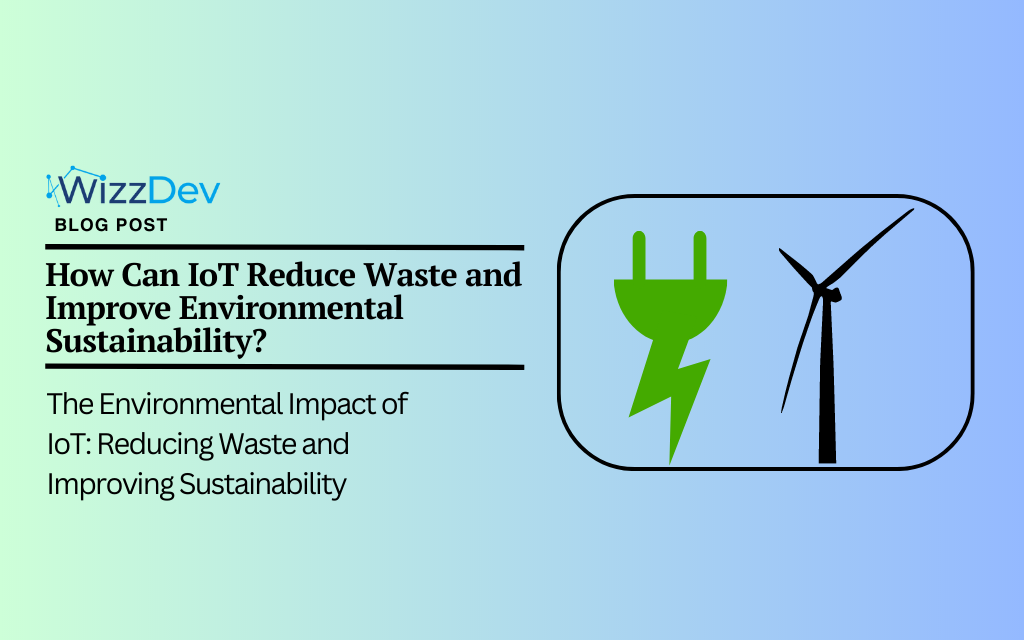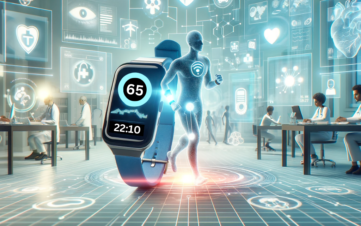The Internet of Things (IoT) is a paradigm-shifting technology that has revolutionized the way we connect a large number of devices, providing new levels of automation, efficiency, and convenience. With billions of linked devices in use worldwide, IoT has the potential to transform many facets of our lives, from smart cities to transportation to agriculture. However, as we continue to advance in innovation and the development of new technology, it becomes increasingly crucial to address the environmental issues our world faces.
Climate change, resource depletion, and waste generation pose severe dangers to the environment and our well-being. It is essential to investigate how we can use the potential of IoT to minimize these problems. This article will examine how IoT applications might help create a greener, more responsible future by reducing waste and enhancing sustainability. By being aware of the effects IoT has on the environment, we can collaborate to create environmentally friendly solutions that help the Earth and its inhabitants.
IoT Applications for Reducing Waste
The potential of IoT to minimize waste and enhance resource efficiency is immense, as it can provide valuable insights and automation in various sectors. IoT can improve agriculture, logistics, waste management, and building energy efficiency.
- Agriculture: Sensors can monitor soil and weather conditions in real-time, allowing farmers to make informed decisions regarding irrigation and fertilizer use.
- Logistics: IoT devices can track shipments and optimize transportation routes, reducing fuel consumption and minimizing waste.
- Waste Management: IoT sensors can measure the fill levels of waste containers, optimizing collection routes and preventing overflows.
- Buildings: IoT can optimize HVAC and lighting systems based on occupancy, natural light levels, and user preferences, reducing energy consumption and waste.
IoT Solutions for Enhancing Sustainability
IoT can help promote sustainability by improving resource management and conservation. Here are some solutions that can enhance sustainability across various sectors:
- Efficient management of renewable energy sources: IoT can optimize energy production and consumption from renewable sources such as solar panels and wind turbines.
- Smart water management: IoT can improve water usage practices by implementing smart water meters, leak detection systems, and water quality monitoring.
- Real-time air quality monitoring: IoT can provide real-time data on air quality and identify pollution sources, enabling remedial measures to improve air quality and public health.
- Energy-efficient manufacturing: IoT can reduce waste and lower greenhouse gas emissions by optimizing the energy consumption of industrial machinery and extending the lifespan of equipment through predictive maintenance.

The Role of IoT in Supporting Circular Economy
The circular economy aims to minimize waste and maximize resource efficiency by promoting closed-loop systems that reuse, refurbish, and recycle products and materials. IoT can support this transition by enabling better resource management, waste reduction, and sustainable business models.
IoT applications that promote resource efficiency and waste reduction include:
- Asset tracking: IoT devices monitor the location, status, and usage of assets to optimize utilization and extend their life cycle.
- Product life cycle tracking: IoT technologies track products throughout their life cycle, providing insights into usage patterns and maintenance needs.
IoT also supports innovative business models and practices, such as:
- Product-as-a-service (PaaS): Shifting from product ownership to a service-based model reduces waste and promotes sustainable consumption patterns.
- Sharing economy: IoT facilitates sharing of assets and resources, reducing the need for individual ownership and promoting efficient resource utilization.
Challenges in Implementing IoT for Environmental Sustainability
While IoT can significantly contribute to environmental sustainability, organizations must address challenges when implementing IoT solutions for this purpose:
Data security and privacy
IoT devices collect and transmit vast amounts of data, raising concerns about data security and privacy. Protecting sensitive information and complying with relevant regulations is crucial.
Energy consumption
As the number of IoT devices increases, so does their energy consumption. It is important to consider energy efficiency and develop strategies to minimize environmental impact.
Disposal and recycling
The rapid growth of IoT devices raises concerns about e-waste and responsible disposal. Organizations must consider end-of-life management, minimizing waste and environmental harm.
Overcoming implementation challenges
Successfully deploying IoT solutions may involve overcoming challenges, such as technical complexity, lack of expertise, or resistance to change. Investing in necessary resources, such as skilled personnel, training, and infrastructure upgrades, can ensure the successful adoption of IoT technologies.
The Internet of Things has the potential to make a significant positive impact on our environment by reducing waste, enhancing resource efficiency, and promoting sustainability. From smart agriculture to renewable energy management, IoT technologies can transform various sectors and help address the pressing environmental challenges we face today.
However, to harness the full potential of IoT for environmental sustainability, it is crucial to address the associated challenges, such as data security, energy consumption, and responsible device disposal. By collaborating across industries, governments, and communities, we can work together to develop sustainable IoT practices that contribute to a greener, more responsible future.
Ultimately, the successful implementation of IoT solutions for environmental sustainability requires a concerted effort and commitment from all stakeholders. By embracing IoT technologies and their potential to create a more sustainable world, we can ensure a brighter future for both our planet and its inhabitants.










